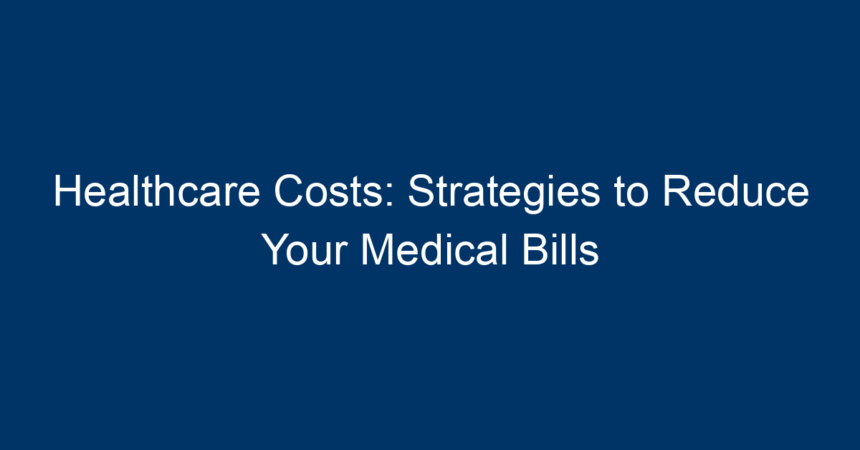In today’s fast-paced world, managing healthcare costs has become more critical than ever. With rising medical bills and the increasing complexity of health insurance, many individuals find themselves overwhelmed by the financial burden associated with healthcare. According to recent studies, a significant portion of Americans struggle with medical debts, often leading to bankruptcy and financial instability. Fortunately, there are effective strategies to mitigate these expenses without compromising the quality of care.
In this article, we will explore actionable strategies to reduce your medical bills, optimize your healthcare spending, and ultimately take control of your financial wellbeing. From understanding your insurance policy to employing cost-effective practices, you’ll discover how to navigate the complicated healthcare landscape with confidence.
Understanding Healthcare Costs: What You Need to Know
Before diving into strategies for reducing medical bills, it’s essential to understand what contributes to healthcare costs. These costs can arise from various sources, including:
- Insurance Premiums: The monthly fee paid for health insurance coverage.
- Deductibles: The amount you pay out-of-pocket before your insurance starts covering expenses.
- Co-pays and Co-insurance: Fixed amounts or percentages you pay for specific services after deductibles have been met.
- Out-of-Network Charges: Higher costs incurred when you receive care from providers not part of your insurance network.
By grasping these components, you can better navigate your healthcare plan and identify cost-saving opportunities.
Evaluate Your Health Insurance Plan
1. Choosing the Right Plan
Selecting the right health insurance plan can significantly impact your healthcare costs. Take the time to compare different plans, focusing on premium costs, deductibles, and the range of providers included. Here are a few tips:
- Analyze Your Healthcare Needs: Assess your typical healthcare usage. Do you frequently visit specialists? Consider a plan with lower co-pays for specialist visits.
- Look for Preventive Care Coverage: Many insurance plans cover preventive services at no cost. Accessing these services can prevent costly treatments down the line.
- Review Provider Networks: Ensure your preferred doctors and hospitals are in-network. Out-of-network services can lead to unexpectedly high bills.
2. Understanding Benefits and Limitations
Once you’ve selected a plan, familiarize yourself with its specifics. Understand your deductible, co-pay structure, and maximum out-of-pocket costs. Transparency in your plan can help you make informed decisions about when to seek medical care and avoid surprise expenses.
Proactive Healthcare Management
1. Regular Preventive Care
Investing in preventive care can save a significant amount on healthcare costs. Regular check-ups and screenings help detect potential health issues early, reducing the need for expensive treatments later. Here are a few preventive measures:
- Annual Physical Exams: Many basic exams are covered by insurance, helping you stay on top of your health without incurring extra costs.
- Vaccinations: Vaccines are crucial for preventing diseases and are often free or low-cost, depending on your insurance plan.
2. Keeping Track of Medical Records
Maintaining an organized medical record can facilitate more efficient and cost-effective healthcare management. This includes:
- Tracking Appointments: Stay on top of upcoming appointments to avoid last-minute cancellations, which can lead to fees.
- Recording Prescriptions: Maintain a list of medications and their costs. When discussing treatment options with your provider, use this list to consider alternatives that may be more affordable.
Smart Shopping for Healthcare Services
1. Cost Comparison
Not all healthcare providers charge the same rates for services. Websites and tools designed for price comparison can help you find reasonable options:
- Healthline and GoodRx: These platforms can provide information on the varying costs of medications across pharmacies.
- Hospital Price Estimator Tools: Many hospitals now provide online calculators to help estimate the costs of procedures, enabling you to compare prices before making decisions.
2. Negotiate Costs
Many people are unaware that they can negotiate medical bills. When facing a high bill:
- Request a Detailed Itemization: Ask for a breakdown of charges and identify any discrepancies.
- Inquire About Discounts: Some providers offer discounts for uninsured patients or those who pay in full upfront.
Financial Assistance Programs
1. Explore Community Programs
Many communities offer programs aimed at reducing healthcare costs. These may provide subsidized services, free clinics, or financial aid.
- Nonprofit Organizations: Look for local nonprofits that offer healthcare assistance or connect you with affordable services.
2. Government Assistance as a Resource
If you’re struggling to afford healthcare, consider government programs:
- Medicaid and CHIP: These programs provide low-cost or free health coverage to eligible individuals and families based on income and size.
- Healthcare Marketplace Subsidies: Depending on your income, you may qualify for subsidies that lower your insurance premiums in the Health Insurance Marketplace.
Maintaining a Healthy Lifestyle
Preventing illness can dramatically reduce your healthcare costs. Investing in a healthy lifestyle pays off in the long run. Here are some tips:
- Balanced Diet: Eating a nutritious diet reduces the risk of chronic diseases, leading to fewer medical visits.
- Regular Exercise: Exercise is vital for maintaining a healthy weight and reducing the risk of health issues.
- Mental Health: Don’t neglect your mental wellbeing. Practices like stress management and mindfulness can prevent long-term healthcare costs associated with mental health issues.
Conclusion: Take Control of Your Healthcare Costs
Managing healthcare costs requires a proactive approach. By understanding your insurance plan, utilizing preventive care, and making informed decisions about medical services, you can significantly reduce your medical bills.
Becoming an informed consumer is your best tool in navigating the complexities of healthcare. Regularly reassess your healthcare plan, stay vigilant about costs, and don’t hesitate to seek financial assistance if needed.
Ultimately, making these strategic choices will not only enhance your financial wellbeing but also contribute to a healthier, happier life. Remember, every step you take today can lead to substantial savings in your future healthcare costs.




